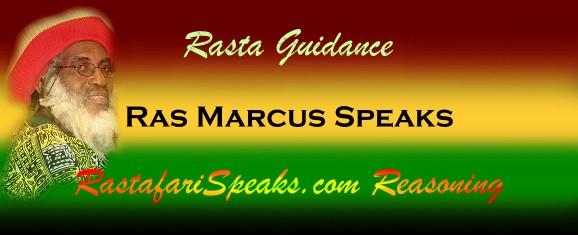
< Prev | 01 | 02 | 03 | 04 | 05 | 06 | 07 | 08 | Next >
Christianity and the Bible
RAS TYEHIMBA: Many of the early Rastas would have grown up in Christian homes. Did it influence the development and growth of the Rasta Movement?
RAS MARCUS: Very much. Some of the songs that Rastafari people sing today were Christian songs. They just changed the words around. Most of us came up in Christianity because our parents went to churches and so on. We learned much about Christianity. We only transferred it over in the name of Rastafari and turned the thing around. It didn't cleanse the movement because it was a Christian doctrine in Jamaica under the British. We have all types of churches there. We have the Catholic, the Baptist, the Presbyterian and all the different things to go with the different churches. When your parents go to church, they would dress you up and take you to another side. When you grow up as a Rasta, you would be looked upon as rebellious because you rebelled against the White picture. Most of those Christ pictures of White paintings would be on the walls in your mother's house. You believed in it because it is coming out of the Bible, therefore, you become very much influenced by the Christian situation in Jamaica.
RAS TYEHIMBA: What are some of the perspectives and even slogans of the early Rasta Movement in the 60s and 70s as you experienced it?
RAS MARCUS: The Rastafari call them (society) Babylon. When you read about the King of Babylon in the Bible, measure to measure, we look at Europe and the Jamaican government and everybody who was not of Rasta as Babylon. They were called Babylon and we would say, "Babylon the great is falling." When you walk in the streets, passing through the city, you would 'burn' the city with fire, lightning and thundering, just like the prophets Jeremiah, Isaiah, Ezekiel and all those people did in the Bible. We took on that same aspect and we spoke in the tongue that is written in the Bible. Even the priest and the older people who were before us spoke that way in the early days. Later on we changed some of it. We were actually acting like the prophets in the Bible. We even had our big rods like what they showed you the prophets in the Bible had. We would go into the city and the market place with our rods and our red, gold and green colours with our locks flowing down. People would get out of the way if you were coming and step across on the other side. They didn't want to be associated with Rasta because they would have been prosecuted by the government. Rastas were very much prosecuted because they were saying another doctrine from what was established in the city, and for shouting, "Africa for Africans at home and abroad," in the public streets and anywhere you go. Sometimes Rastas would see a set of police and say, "Fire for Babylon" and so on.
RAS TYEHIMBA: There is a lot of diversity within the Rasta Movement. What is your perspective on that?
RAS MARCUS: The word Nyabinghi is an East African word. There was a lady named Queen Nyabinghi, who I think was from Uganda. That word came up in the Movement and was taken on as a kind of real name. The Rastafari Movement was way back in 1930 when Marcus Garvey told the people about the coronation in his writings. People wondered what it meant and started researching the Bible. I looked in Revelation and saw that there was a conquering lion spoken of in the Bible. There was also a King of kings and Lord of lords spoken of in Revelation. The connection was made that His Majesty had these titles which were spoken of in the Bible. People started researching and the Bible was looked upon as a book that was truthful and written by some ancient and inspired people.
People have a strong belief in the connection, and, so the movement continued to spread slowly but surely. There weren't a lot of dreadlocks in the Movement when it started. It was just ordinary people who had their hair combed and their little beard growing and so on. But as people started reading, they found out that the Nazarenes had dreadlocks and they let their locks grow. People followed that scripture and they would let their locks grow, even though that scripture said if you look upon a dead body or anything like that, you should cut your locks. After a while, the Rastaman said that if he sees a dead body it couldn't hurt him because he is a living man, and a living man is stronger than a dead lion, so the Rastaman kept his locks. Some people hardly cut their locks if they run into anything. But there was another set who realized that their locks are a part of their body and if their mother didn't brush or comb their hair, their locks would remain. They wear their locks as a living sacrifice or as a living man, praising Mother Nature and Father Time.
Continue...
< Prev | 01 | 02 | 03 | 04 | 05 | 06 | 07 | 08 | Next >
|
|


